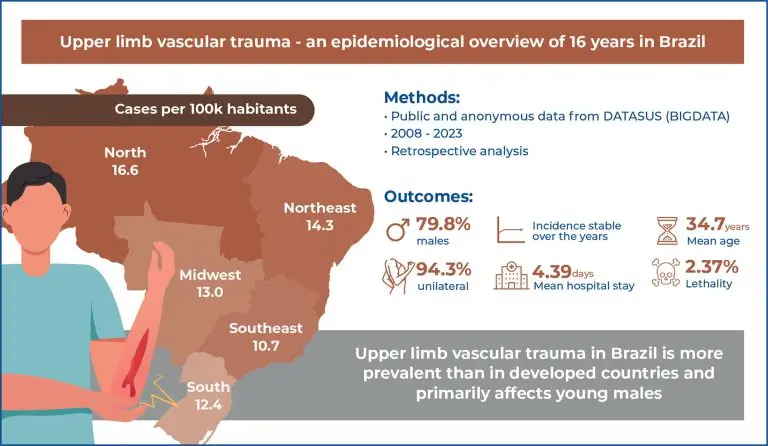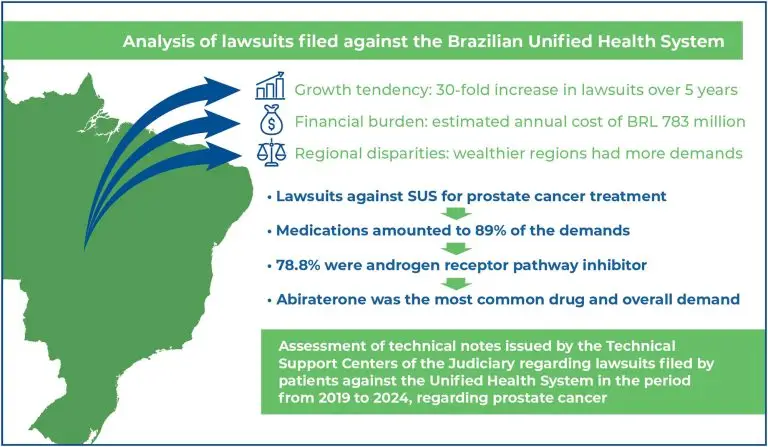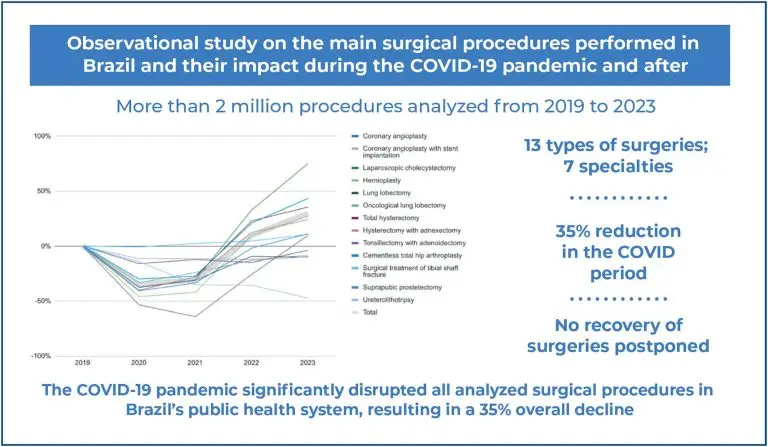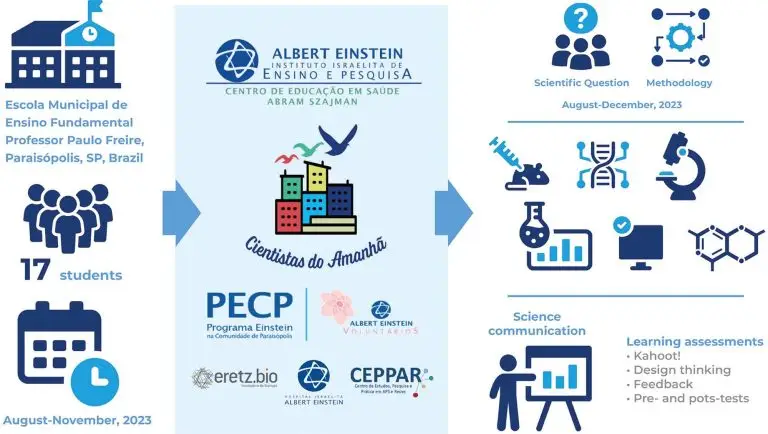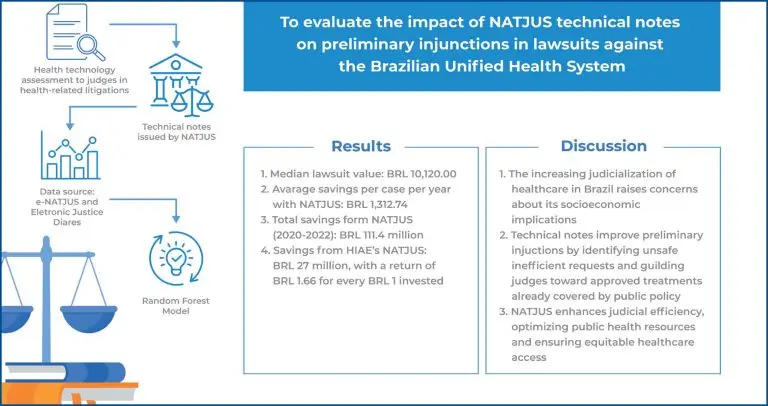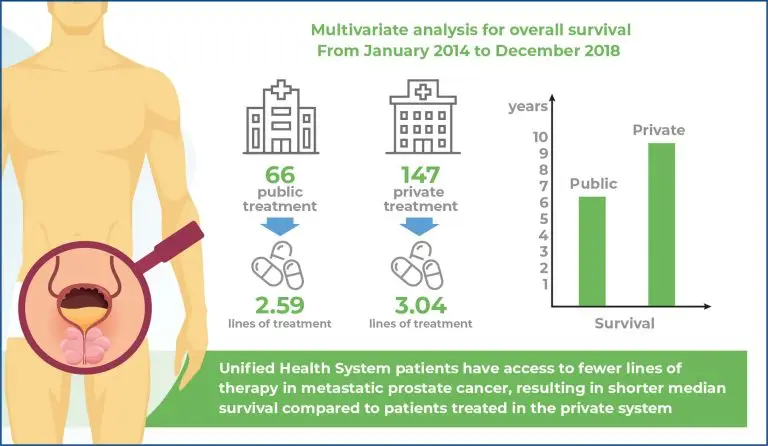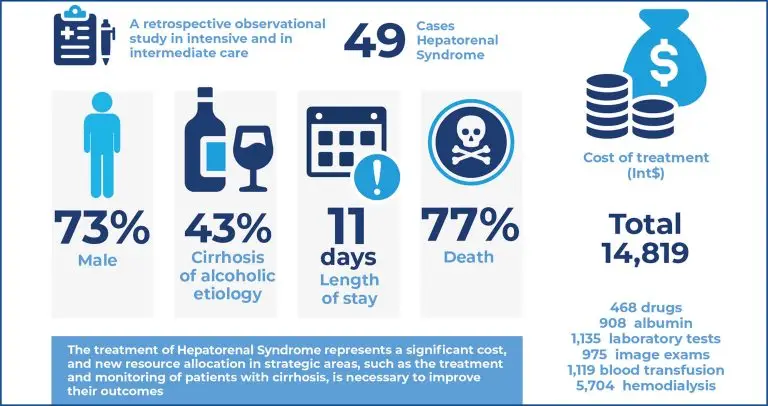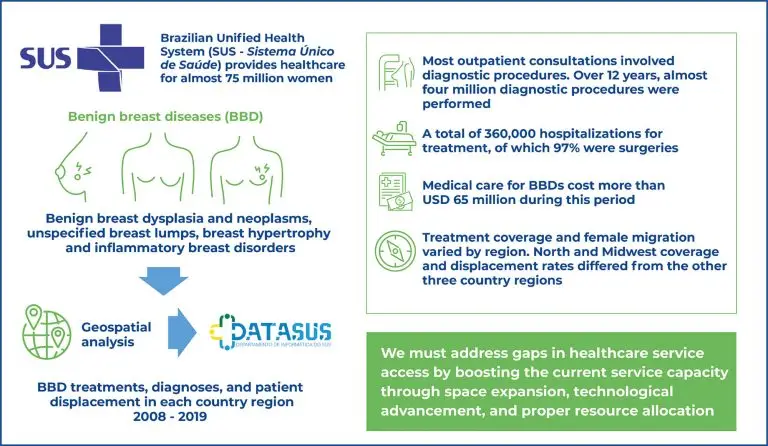03/Oct/2025
Nationwide epidemiological analysis of surgically treated upper limb vascular trauma over 16 years in Brazil
einstein (São Paulo). 03/Oct/2025;23:eAO1339.
View Article03/Oct/2025
Nationwide epidemiological analysis of surgically treated upper limb vascular trauma over 16 years in Brazil
DOI: 10.31744/einstein_journal/2025AO1339
Highlights ■ Brazil had a higher upper limb vascular trauma incidence than the US, remaining stable over the years. ■ The region with the highest proportion of cases was the North, followed by the Southeast. ■ The most affected population was young men, with a lethality of 2.37%, comparable to that globally. ■ Most patients did not require intensive care (92.8%), and the average hospital stay was 4.39 days. ABSTRACT Objective: To evaluate the epidemiology of upper limb vascular trauma […]
Keywords: Brazil; Data mining; Epidemiology; Health Information System; Incidence; Upper extremity; Vascular injury
12/Sep/2025
Judicial demands for prostate cancer treatment in Brazil: androgen receptor pathway inhibitors are an urgent public health problem
einstein (São Paulo). 12/Sep/2025;23:eGS1301.
View Article12/Sep/2025
Judicial demands for prostate cancer treatment in Brazil: androgen receptor pathway inhibitors are an urgent public health problem
DOI: 10.31744/einstein_journal/2025GS1301
Highlights ■ A total of 89% of the 3,136 legal demands sought medication. ■ Androgen inhibitors amounted to 78.8% of all lawsuits, particularly abiraterone. ■ There is a growth tendency in judicialization, with a 30-fold increase over 4 years. ■ The estimated annual financial burden of judicialization on the Brazilian United Public Health System has reached BRL 783 million. ABSTRACT Objective: Considering the difficulties of Brazil’s Public Health System in providing comprehensive care, the present article aimed to assess legal […]
Keywords: Brazil; Cost analysis; Judicial role; Prostate neoplasms; Public helath; Publoic policy; Receptors, androgen
19/Aug/2025
What happened to the most frequent surgeries performed in the Brazilian Unified Health System during and after the COVID-19 pandemic? An analysis of 2 million procedures
einstein (São Paulo). 19/Aug/2025;23:eAO1399.
View Article19/Aug/2025
What happened to the most frequent surgeries performed in the Brazilian Unified Health System during and after the COVID-19 pandemic? An analysis of 2 million procedures
DOI: 10.31744/einstein_journal/2025AO1399
Highlights ■ More than 2 million procedures were analyzed in the public health system from 2019 to 2023. ■ A total of 13 types of procedures were performed across 7 different specialties. ■ A 35% reduction in the total number of surgeries was observed. ■ There was no recovery of surgeries postponed during the pandemic. ABSTRACT Objective: To analyze changes in surgical volume across different specialties in Brazil before, during, and after the COVID-19 pandemic. Methods: This descriptive observational study […]
Keywords: Brazil; Brazilian Unified Health System; COVID-19; Health Information Management; Health services needs and demand; Pandemics; Public health; Surgical procedures, operative
08/Aug/2025
Cost-benefit analysis of implementing Vendor Neutral Archive (VNA) technology in the Brazilian Public Health System
einstein (São Paulo). 08/Aug/2025;23:eGS1219.
View Article08/Aug/2025
Cost-benefit analysis of implementing Vendor Neutral Archive (VNA) technology in the Brazilian Public Health System
DOI: 10.31744/einstein_journal/2025GS1219
Highlights ■ Vendor Neutral Archive implementation has an return on investment of 5.63% in the first year and 10.12% after three years. ■ At least 11,500 exams are needed annually for a positive return on investment in the first year after implementation. ■ Vendor Neutral Archive enhances interoperability and efficiency by standardizing and centralizing image storage. ■ Scalability is key: higher adoption of Vendor Neutral Archive leads to greater financial and operational benefits. ABSTRACT Objective: To conduct an ex-ante cost-benefit […]
Keywords: Brazil; Cloud computing; Cost-benefit analysis; Diagnostic imaging; Government programs; Information storage and retrieval; Public health; Radiology Information Systems; System integration; Vendor neutral archive
11/Jul/2025
Second Edition of the Scientists of Tomorrow/Cientistas do Amanhã Project: advancing scientific thinking, methodology, and equitable education
einstein (São Paulo). 11/Jul/2025;23:eAE1513.
View Article11/Jul/2025
Second Edition of the Scientists of Tomorrow/Cientistas do Amanhã Project: advancing scientific thinking, methodology, and equitable education
DOI: 10.31744/einstein_journal/2025AE1513
Highlights ■ Ensuring quality education, providing vocational training, and promoting communication technology, technical, and scientific programs are goals set by the United Nations to enhance learning opportunities for all. ■ Critical thinking, fostered through theoretical and practical activities, is essential for building relevant skills, including literacy and numeracy. ■ The Scientists of Tomorrow/Cientistas do Amanhã project is a reproducible initiative that can be implemented in other research centers and schools. ABSTRACT The Scientists of Tomorrow project is a partnership between […]
Keywords: Brazil; Delivery of health care; Educational personnel; Elementary school; Quality education; Schools; Science; Scientific methodology; Soft skills; Students
02/Jul/2025
Use of propensity score matching to reduce bias in economic evaluations in the context of Brazilian liver transplantation
DOI: 10.31744/einstein_journal/2025AO1329
Highlights ■ Matching methodologies may reduce bias in economic evaluations. ■ Liver transplantation within the Proadi-SUS context has an incremental cost-effectiveness ratio below the Health Technology Incorporation in the Brazilian Health System threshold. ■ The patients who received transplant had a median survival of 10.1 years after list enrollment. ■ The mean cost per transplanted patient was US$ PPP 162,821.96. ABSTRACT Objective: To estimate the incremental cost and survival of patients on the liver transplantation waiting list who were referred […]
Keywords: Brazil; Cost-benefit analysis; Hospital costs; Liver transplantation; Propensity score; Survival rate; Unified Health System; Waiting lists
29/May/2025
Impact evaluation of technical notes issued by NATJUS on healthcare judicialization
DOI: 10.31744/einstein_journal/2025GS0766
ABSTRACT Introduction: Technical Support Centers of the Judiciary (NATJUST), provide health technology assessments to judges in health-related litigations against both public and private healthcare systems. These centers provide technical notes, that can assist Brazilian Courts in making provisional rulings and determining patient access to health services during legal proceedings. Objective: This study aimed to evaluate the impact of NATJUS technical notes on preliminary injunctions in lawsuits against the Brazilian Unified Health System. Specifically, we analyzed the alignment between judicial decisions […]
Keywords: Brazil; Costs and cost analysis; Health judicialization; Health systems; Impact evaluation; NATJUS; Preliminary injunction; Technical notes
22/Apr/2025
Socioeconomic inequities in prostate cancer care: private versus public treatment settings pose a significant impact on overall survival
einstein (São Paulo). 22/Apr/2025;23:eAO0851.
View Article22/Apr/2025
Socioeconomic inequities in prostate cancer care: private versus public treatment settings pose a significant impact on overall survival
DOI: 10.31744/einstein_journal/2025AO0851
Highlights ■ Men with metastatic prostate cancer in the public system have access to fewer treatment lines. ■ Survival in the public system was 3 years shorter than that in the private setting (78 versus 115 months). ABSTRACT Objective: To evaluate the impact of assistance from public and private health systems on the overall survival of patients with metastatic prostate cancer. Methods: A total of 213 patients with metastatic prostate cancer treated at the A.C. Camargo Cancer Center, either in […]
Keywords: Brazil; Health Services; Health systems; Neoplasm metastasis; Private sector; Prostatic neoplasms; Public sector; Race factors; Social determinants of health; Survival analysis
28/Mar/2025
Hepatorenal Syndrome: direct treatment costs and characteristics of patients admitted to intensive care
DOI: 10.31744/einstein_journal/2025GS0390
Highlights ■ The treatment of Hepatorenal Syndrome places a huge economic burden on healthcare systems. ■ Cost analysis studies of Hepatorenal Syndrome management can help to rationally allocate resources in healthcare. ■ Timely diagnosis and management of Hepatorenal Syndrome may reduce mortality, resource utilization and costs. ABSTRACT Objective: The purpose of this study was to describe the direct medical costs incurred in Brazil for the treatment of Hepatorenal Syndrome in intensive care and intermediate therapy care units, and to investigate […]
Keywords: Brazil; Cost of illness; Direct service costs; Health care costs; Health care economics and organizations; Hepatorenal Syndrome; Liver cirrhosis; Multiple organ failure; Septic shock
28/Mar/2025
Brazil’s benign breast disease care profile and geospatial analysis
DOI: 10.31744/einstein_journal/2025AO1132
Highlights ■ Most outpatient consultations comprised diagnostic procedures. ■ In the past 12 years, medical care for benign breast diseases has cost >USD 65 million. ■ Women from North and Midwest Brazil had higher diagnosis and treatment displacement rates. ABSTRACT Objective: To quantitatively and geospatially analyze coverage and displacement for the diagnosis and treatment of benign breast diseases in the Brazilian Unified Health System between 2008 and 2019. Methods: Datasets from the Brazilian Ministry of Health were used to survey […]
Keywords: Brazil; Breast diseases; Breast neoplasms; Demography; Epidemiology; Health expenditures; Healthcare costs; Hospitalization; Incidence; Primary healthcare; Public health; Strategy planning; Unified Health System



